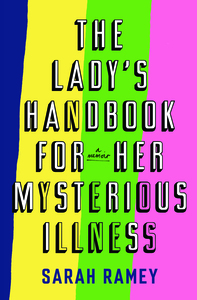Take a photo of a barcode or cover
I bought this book because I needed someone to relate to. I, myself, am what Sarah Ramey would call a WOMI. I spent most of last year fighting with an invisible illness that no one could see and no doctor took seriously. I was prescribed anti-depressants and told to go home many a time. I figured out my issue for myself, much as Ramey had to do and what many women who can't be easily diagnosed have to do, and have found what works for me. When I started reading this book, I related to Ramey. I sympathized with her account of being mis-treated by impatient and sexist doctors. It happened to me too. The latter half of this book, however, is when I began to not like this book anymore. Ramey is not a scientist (or science writer). I, actually, am a scientist. So to hear a person talk about this NEW and POORLY UNDERSTOOD science as proven facts.....it made me want to jump out of my skin. The science she deals with in this book is nascent -- we are JUST beginning to study the microbiome, for example. So when I read a sentence like: "many of the ingredients she grew up thinking were totally normal have actually been proven to be endocrine-disrupting, carcinogenic".....I want to SCREAM. If I took a shot every time she wrote the word "proof" or "proven," I'd be in deep trouble. Just because there IS a study that one can find after 10 minutes of google-ing, does not mean it is a GOOD study that is to be trusted. And especially in the realm of nutrition science, microbiome science, and the like, there are so many conflicting results because these things are so hard to study. And we just don't know how to do it well yet. I understand being in the position of wanting to try anything to feel healthy. I did it, and many people who have chronic illness don't have time to wait for science to do replicates of randomized clinical trials because their life is happening now. But Ramey's discussion of this stuff as if it's solved science is irresponsible and flawed. Additionally, while this may be seen as dismissive, I don't mean it that way, but not once in this book does she mention the power of the placebo effect, which we actually DO have good science to show is a powerful way to change how people feel. It's fine that she is sharing her advice and her roadmap of how she came to a routine that works for her. But none of this should be presented as anything other than her trying things and taking risks and being unsure of what exactly is working on her body because she hasn't studied it in a rigorous and meaningful way and neither has science.
As a woman with several chronic illnesses, I had picked up this book hoping to get a new perspective or at the very least, hear the story of another who also had to contend with the overt medical sexism in the American healthcare system.
Instead, what I got was a meandering, self-absorbed, classist perspective that mentions meetings and interviews with other women but we rarely hear their stories. She also doesn't do a very good job of taking stock of her privilege and all the benefits it afforded her throughout this journey. If this is truly meant to not only be a memoir but a guide for other women in the same boat, why not include the more of what the other stories were? I found myself only able to relate to a slither of what she describes. She, coming from such a prominent, legendary medical family and all (and she mentions this over and over and over again) then there's "WOMI"* like me. Having to go to free health clinics at one point. Too broke for an ambulance ride so I have to hop in an Uber and pray I don't collapse on my way to the urgent care clinic because the Emergency room was also too expensive for me. And heaven forbid she actually touch upon medical racism. You think what you went through was harsh? Try doing so as a woman of color. What about us WocMIs? What you went through was more of the golden, VIP status of navigating the American Healthcare System. It would have been nice to see that acknowledged and addressed as well.
This book really feels more like a handbook for other women like her. Those who come from privilege and wealth that somehow couldn't buy them into a fast pass to an accurate diagnosis. As a handbook, a guide for chronically ill women as a whole? Not so much.
*WOMI feels like "Fetch" from Clueless. It's not gonna happen, Sarah.
Instead, what I got was a meandering, self-absorbed, classist perspective that mentions meetings and interviews with other women but we rarely hear their stories. She also doesn't do a very good job of taking stock of her privilege and all the benefits it afforded her throughout this journey. If this is truly meant to not only be a memoir but a guide for other women in the same boat, why not include the more of what the other stories were? I found myself only able to relate to a slither of what she describes. She, coming from such a prominent, legendary medical family and all (and she mentions this over and over and over again) then there's "WOMI"* like me. Having to go to free health clinics at one point. Too broke for an ambulance ride so I have to hop in an Uber and pray I don't collapse on my way to the urgent care clinic because the Emergency room was also too expensive for me. And heaven forbid she actually touch upon medical racism. You think what you went through was harsh? Try doing so as a woman of color. What about us WocMIs? What you went through was more of the golden, VIP status of navigating the American Healthcare System. It would have been nice to see that acknowledged and addressed as well.
This book really feels more like a handbook for other women like her. Those who come from privilege and wealth that somehow couldn't buy them into a fast pass to an accurate diagnosis. As a handbook, a guide for chronically ill women as a whole? Not so much.
*WOMI feels like "Fetch" from Clueless. It's not gonna happen, Sarah.
dark
emotional
informative
sad
medium-paced
challenging
dark
emotional
funny
hopeful
slow-paced
the memoir bits of this were an interesting and relatable read but I hated all the gender essentialism and the privilege in the sciencey bits
challenging
dark
emotional
funny
hopeful
informative
inspiring
reflective
medium-paced
I loved this book and learned so much! It was very dark and gruesome at parts but I found I wanted to keep reading. As a gender diverse person, I would have preferred less gendered writing or at least a note to say - “women” does not only mean people that identify as women. I also would have liked the author to acknowledge her privilege in a more direct way (she mentions it a couple of times). And I feel ableism could have been a much bigger, more direct topic in the book too!
Graphic: Chronic illness, Misogyny, Sexism, Medical content, Medical trauma
Minor: Suicidal thoughts
loved being taken through this journey, which is hard to say given how brutal dealing with chronic & autoimmune ilnesses can be. ramey's style and clear tone of voice made that possible
challenging
emotional
informative
slow-paced
Wow this was long. And sort of transphobic. And preachy. And privileged.
I enjoyed the parts that were about her medical journey. Didn't need the societal commentary and hero vs. heroine nonsense.
I enjoyed the parts that were about her medical journey. Didn't need the societal commentary and hero vs. heroine nonsense.




